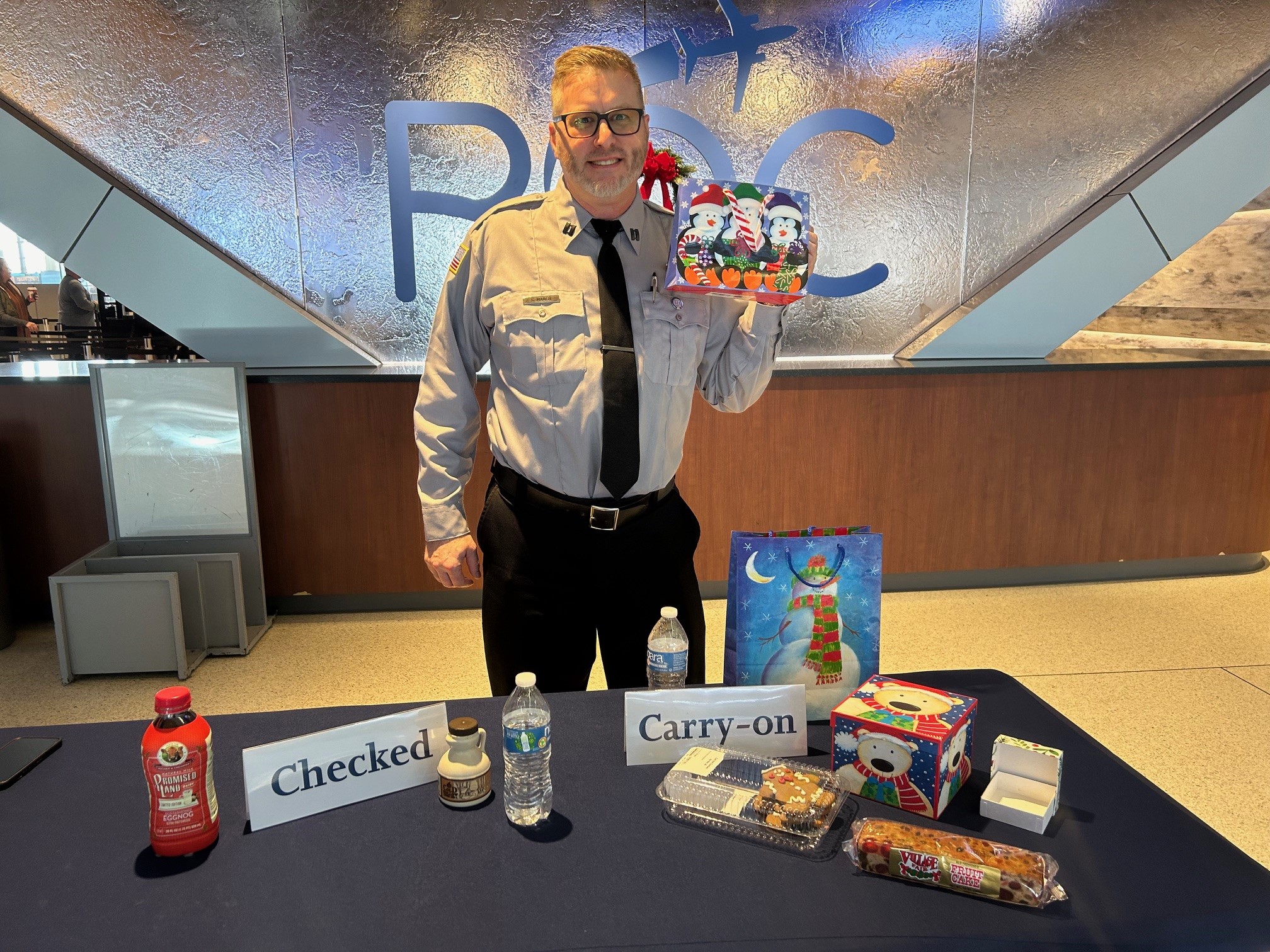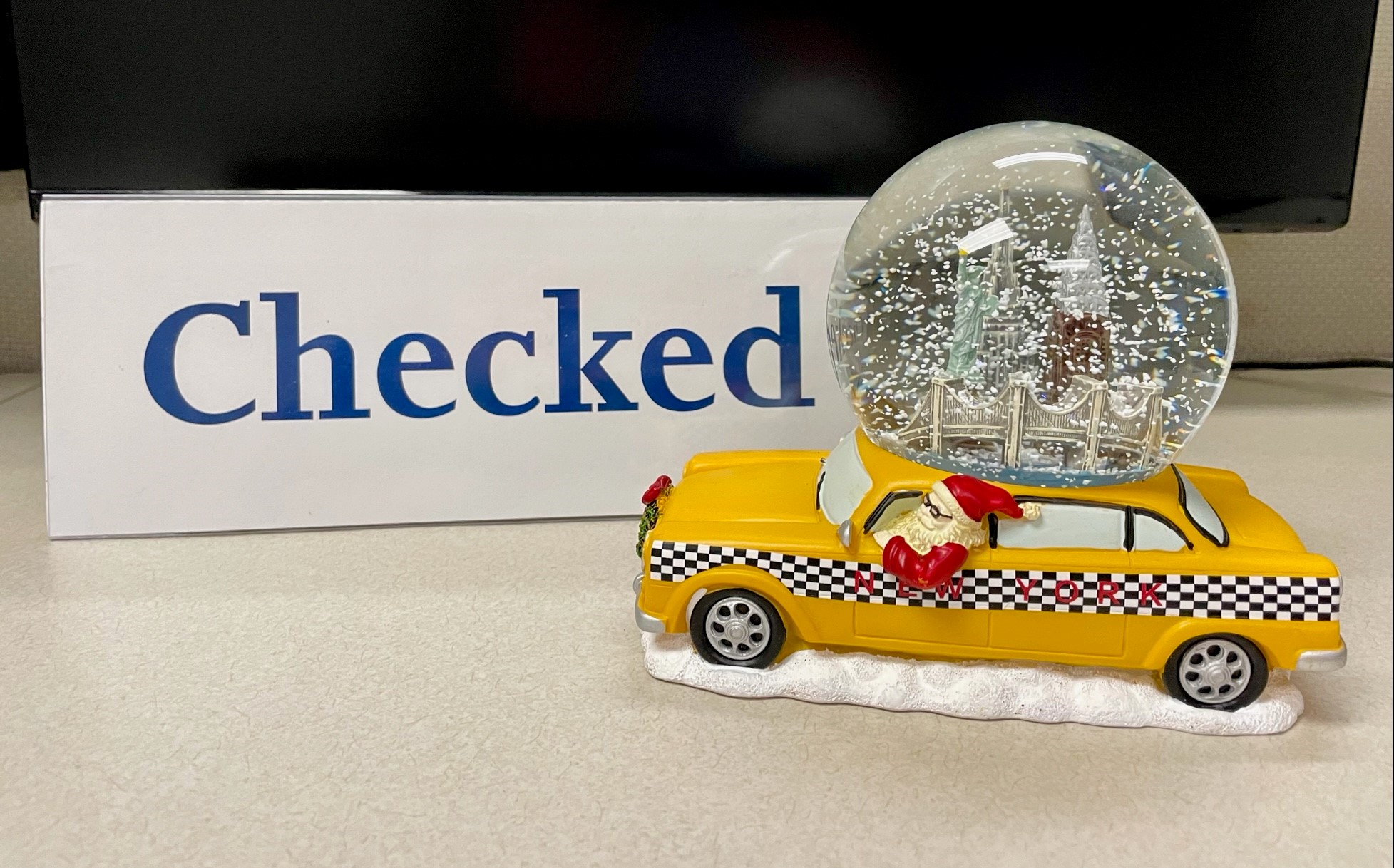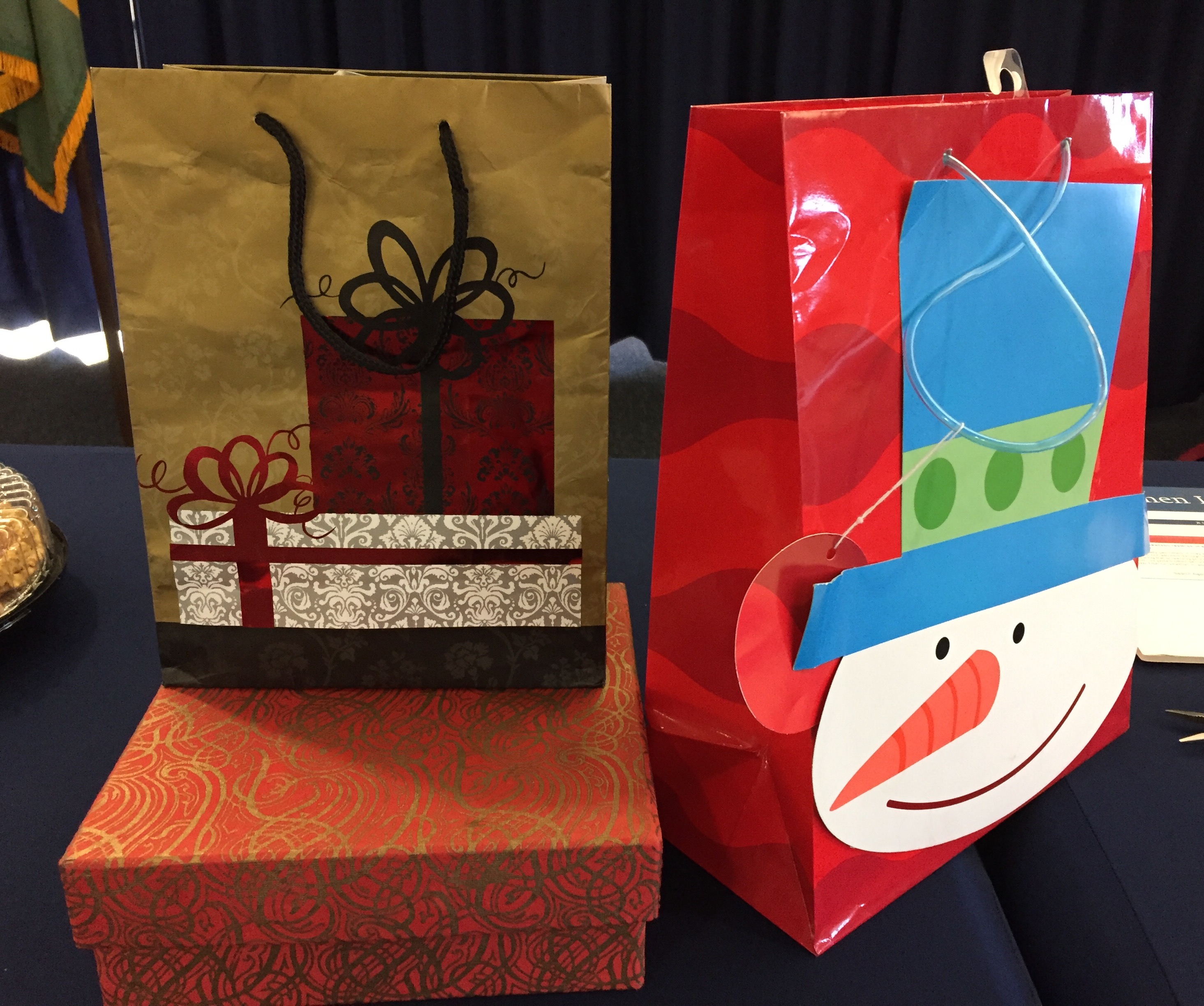 Passengers who are traveling with gifts should pack them in gift bags or gift boxes instead of in wrapping paper so if the gift triggers an alarm, the security officer will not have to unwrap the gift. (TSA photo)
Passengers who are traveling with gifts should pack them in gift bags or gift boxes instead of in wrapping paper so if the gift triggers an alarm, the security officer will not have to unwrap the gift. (TSA photo)
ROCHESTER, N.Y.-- The Transportation Security Administration (TSA) is prepared for holiday travelers who are planning to fly out of Frederick Douglass Greater Rochester International Airport during the Christmas and new year holidays as passenger volume is expected to increase during the end-of-year travel period.
“Planning ahead and packing properly can facilitate the TSA security screening process and ease a passenger’s travel experience at the airport,” said Bart R. Johnson, TSA’s Federal Security Director for Upstate New York. “That’s why it is important to know what can be packed in carry-on and/or checked baggage before arriving at the airport.”
The most common thing that slows down a traveler at a TSA checkpoint is having a prohibited item in a carry-on bag, which is why it is important for travelers to “Know Before You Go” by knowing the contents of their carry-on bags and ensuring that everything that they pack inside is permitted to be carried onto a flight.
“We are seeing a lot of travelers arrive at our checkpoints with beverages and a variety of knives,” Johnson said. “It’s important to remember that liquids, gels, aerosols and spreadables are limited to 3.4 ounces in one clear quart-sized bag in carry-on bags. Finish that bottle of water, energy drink or cup of coffee before you get to the checkpoint. Pack the larger shampoo, toothpaste, sunblock and hair gel in a checked bag. As for knives, if you must travel with a knife, please pack it in your checked bag."
TSA’s advice is that when a traveler is ready to pack for a trip that it is best to start with an empty bag so the passenger knows with certainty what they have inside and they know that there is nothing prohibited in a side pouch, zippered pocket or in the bottom of a bag. That goes for backpacks, roller bags, handbags, messenger bags, shoulder bags, laptop bags, duffle bags and any other carry-on bag or luggage.
TSA saw increased travel volume during the Thanksgiving holiday travel period and an uptick ahead of Christmas and the new year holidays is expected.
“Travelers should also listen to the guidance that our TSA officers are offering to assist travelers through the security screening process,” Johnson said. “And remember to thank them this holiday season. Remember, they are working during the holiday so you can travel.”
Here are some helpful holiday travel tips.
Tip #1: Get to the airport early

Travelers should arrive a minimum of two hours before their scheduled domestic flights and three hours before scheduled international flights.
If you find yourself waiting in a security checkpoint lane, use that time to your advantage. That’s the ideal time to remove items from your pockets and place them into a carry-on bag. It’s also the time to get out your ID and boarding pass so you’re not fumbling in your wallet for your ID when you step up to the TSA travel document checking podium.
Tip #2: Know before you go
Travelers need to know what can and cannot go in their carry-on bag, from firearms to oversize liquids. Passengers will spend more time in the security checkpoint if their carry-on items trigger an alarm because it results in TSA’s need to resolve the alarm by opening the carry-on bag to determine what triggered the alarm.
The most common item that travelers bring to the checkpoint that is not permitted through the screening process are liquids, gels and aerosols that are larger than the acceptable limit. Each passenger may carry liquids, gels and aerosols that are 3.4 ounces (100 ml) or smaller through a checkpoint as long as those items fit into a one quart-sized, resealable bag. This is known as the 3-1-1 bag. Common travel items that must comply with the liquids rule include toothpaste, shampoo, conditioner, sun block, body spray, mouthwash and lotions. Containers of liquids, gels and aerosols that are larger can be transported in checked baggage. This includes snow globes, which are popular at this time of the year.
TSA officers also are seeing travelers arrive at the checkpoint with bottles of water, juice, energy drinks, coffee and soda. TSA officers will give travelers the choice to exit the security checkpoint to drink their beverages in the terminal or allow the officer to dispose of it. Travelers may bring empty containers such as a water bottle or insulated container through checkpoints and fill them after passing through the checkpoint.
TSA is on pace to set a record for the most firearms caught at checkpoints in a year. “This is not the type of record that TSA seeks to set,” Johnson said. “We would rather see fewer travelers bringing guns to checkpoints. I need all responsible gun owners to clear their carry-on bag of any weapons, ammunition and any other dangerous items before they come to the airport. Bringing these to checkpoints will likely travelers to the point of missing their flight. This also disrupts and severely delays screening process for everyone in line.”

Tip #3: Use TSA’s tools for your resources
Unsure if an item should be packed in a carry-on bag, checked bag, either or neither? Download the free myTSA app, which has a handy “What can I bring?” feature that allows you to type in the item to find out if it can fly. Or ask on Twitter or Facebook Messenger at @AskTSA. Travelers may send a question by texting “Travel” to AskTSA (275-872).
TSA Cares is a helpline that provides travelers with disabilities, medical conditions and other special circumstances additional assistance during the security screening process. Call 72 hours prior to traveling at 855-787-2227 with questions about screening policies, procedures and what to expect at the security checkpoint. Or email TSA Cares. TSA Cares is available 8 a.m. to 11 p.m. ET on weekdays and from 9 a.m. to 8 p.m. ET on weekends and holidays.
Tip #4: Traveling with gifts
This is the time of year that passengers travel with gifts. TSA recommends packing gifts in gift bags or boxes instead of wrapping them because if a gift triggers an alarm, it will need to be opened to resolve the alarm. Wrapped presents that trigger an alarm will need the gift wrap removed, but if the gift is in a bag or a box, it is much easier for TSA to look at the item to resolve the alarm.
Tip #5: Traveling with food
Individuals often like to travel with food items during the holiday season. Foods may be transported on flights. Solid food items like fruitcake, candy canes and chocolates are solids and may be transported in a carry-on bag. However, liquids and spreadable foods such as egg nog, wine, champagne, maple syrup and preserves are not solid and should be packed in checked bags. Here’s a helpful tip: If you can spill it, spread it, spray it, pump it or pour it and it is larger than 3.4 ounces, it needs to be packed in a checked bag.
